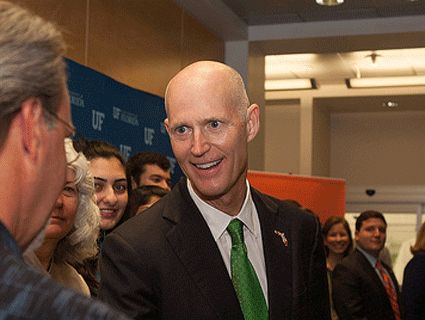
<a href="http://www.shutterstock.com/cat.mhtml?lang=en&search_source=search_form&search_tracking_id=xIHsnJ319xPfcd93PCk4mA&version=llv1&anyorall=all&safesearch=1&searchterm=unemployment+benefits&search_group=&orient=&search_cat=&searchtermx=&photographer_name=&people_gender=&people_age=&people_ethnicity=&people_number=&commercial_ok=&color=&show_color_wheel=1#id=104939312&src=zuWp5JI7ZeH3zRp_XKsaog-1-59">Stuart Miles</a>/Shutterstock
Tea partiers revere the Constitution, which they often study like the Bible, in small groups. But somehow all that devotion to the Founders’ original thinking doesn’t seem to have much of an impact on their ability to follow its requirements once tea partiers take power in elected office. Take the case of Florida’s GOP governor Rick Scott, who has turned Florida into the nation’s premiere laboratory for tea party governance. He’s been trying for years now to force poor single mothers to take drug tests before getting welfare benefits, a requirement that’s since been shot down in federal court twice as likely unconstitutional. And the US Department of Justice is threatening to sue the state for unconstitutionally warehousing disabled children in geriatric nursing homes.
Then there’s the state’s unemployment benefits system, which was “modernized” by the legislature under Scott’s leadership in 2011 to become one of the nation’s stingiest. A new law required unemployed people to file all claims for benefits online, even though previously at least 40 percent of UI claims were done over the phone. The new online filing system required people to take a “skills review” test that included 45 math and reading questions. Failing to take the test would result in losing eligibility for benefits.
In 2011, the Miami Workers Center, represented by Florida Legal Services, filed a complaint against the state with the US Department of Labor, complaining that this new system violated the Civil Rights Act and the Americans With Disabilities Act by discriminating against people with limited English skills and disabilities, thus denying them access to benefits to which they are entitled. The Labor Department’s Civil Rights Center investigated the complaint, and earlier this month concluded that Florida’s unemployment system was rife with civil rights abuses.
The new system, it found, was nearly impossible for people with disabilities or limited English skills to navigate. Testers discovered that while the state claimed to have a multilingual telephone hotline to help people who couldn’t figure out the online process, virtually no one could get through to a live person—and when they did, they couldn’t get an interpreter. Calls were frequently disconnected after playing a recorded message telling people to apply for benefits online. Despite a requirement that the phone line provide a message to people in their native language, testers who selected “Spanish” still got a message in English. One tester speaking Punjabi was told by a hotline operator, “I don’t speak gibberish, so call when you learn English.”
Not surprisingly, the denial rate for applications jumped nearly 70 percent in the first three months of 2012, and the percentage of unemployed people in Florida getting benefits dropped to 15 percent, the lowest in the nation.The results of Florida’s experiment impressed legislators in other states, which have been looking to Florida as a model for reform. But under heat now, the state of Florida has agreed to start negotiations to bring its system into compliance with the law. If it fails to do so, it faces the prospect of a civil suit from the US Department of Justice and the loss of federal funds to its unemployment insurance system. “This ruling should give serious pause to states that are thinking of adopting online-only systems and other unemployment program restrictions similar to Florida’s,” said George Wentworth, senior staff attorney with the National Employment Law Project said in a statement this week. Meanwhile, given how frequently these types of decisions seem to be coming out of Florida these days, tea partiers in the legislature and the governor’s office themselves might want to go back to for some remedial classes on the Constitution.













